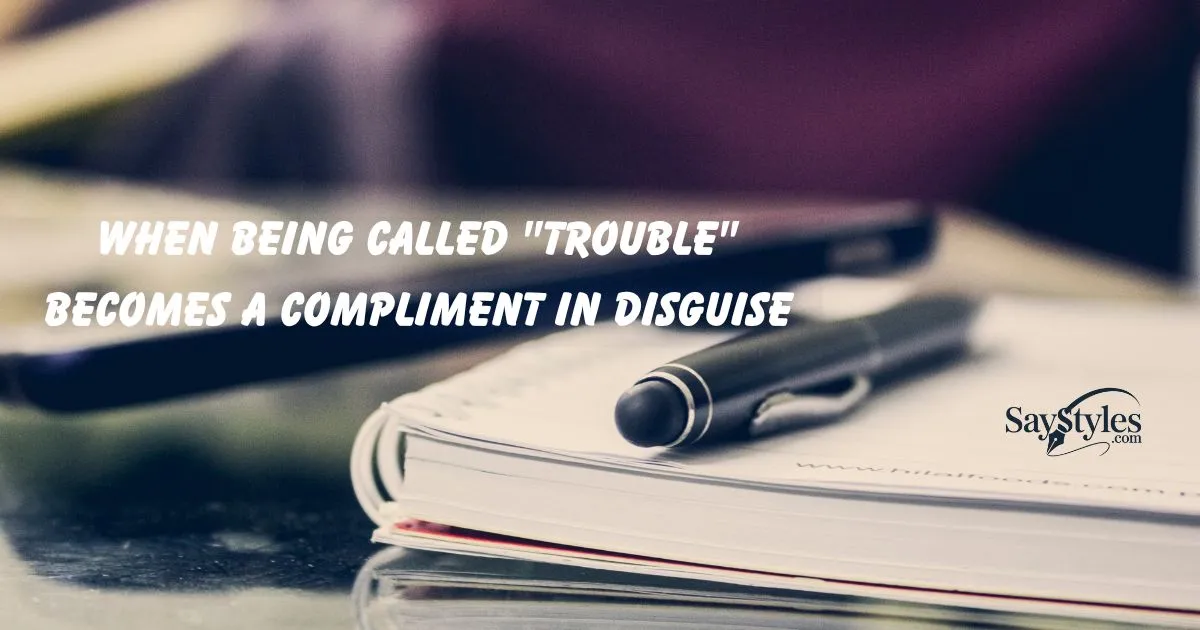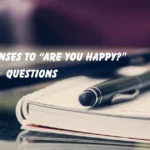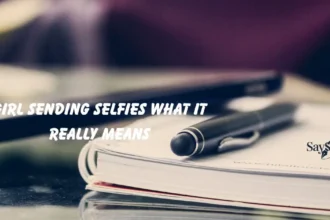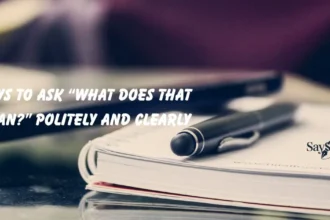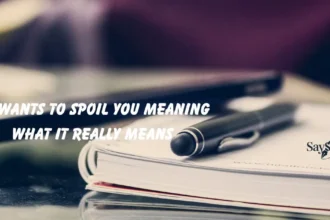They say, “Trouble often comes wrapped in a smile.” Have you ever been called “trouble” by a guy? Maybe it caught you off guard or made you smile. I’m here to help you understand how to respond when someone calls you trouble in a way that feels strong and fun. It’s normal to want to stand your ground and show confidence without being rude.
In this article, I will share simple and clever ways you can reply to a guy who calls you trouble. These responses will help you keep the conversation light, smart, and maybe even a little playful. When you want to tease back or show you’re proud of your bold side, you’ll find good ideas here.
What “Trouble” Really Means
When someone calls you “trouble”, they are usually teasing or acknowledging that you are playful, mischievous, or unpredictable. This phrase appears in casual conversations, flirtatious exchanges, or friendly banter and signals amusement, admiration, or intrigue toward your behavior or personality.
List of Called “Trouble” Becomes a Compliment in Disguise
- “Guilty as charged! What’s your next move?”
- “Trouble? I prefer ‘fun’!”
- “Oh, come on, I’m not that bad!”
- “Trouble? I like to think of it as a good time!”
- “Well, every party needs a little trouble, right?”
- “You should see me in action then!”
- “Trouble? I’m just having a good time!”
- “If by ‘trouble’ you mean ‘fun,’ then yes!”
- “Trouble? More like a whirlwind of excitement!”
- “Trouble is my middle name!”
- “I guess I bring out the adventurous side in people!”
- “Trouble? Sounds like a challenge!”
- “Oh, is that what they’re calling it these days?”
- “I guess you could say I’m just full of surprises!”
- “Trouble? More like a bundle of energy!”
- “I guess I’ve got a knack for keeping things interesting!”
- “If you think I’m trouble now, you should see me when I’m excited!”
- “Trouble? I think you’re just having fun with me!”
- “I guess I’m just full of personality!”
- “Trouble, huh? Well, I do like to keep things lively!”
- “If being ‘trouble’ means having fun, then I’m all for it!”
- “Trouble? I like to call it enthusiasm!”
- “If trouble means being lively, then I guess I’m guilty!”
- “Oh, you know me too well!”
- “Trouble? More like a whirlwind of excitement!”
- “I guess that’s one way to describe it!”
- “Trouble, or just a burst of energy?”
- “Well, I guess I’m just full of surprises!”
- “Trouble? I like to think of it as adventure!”
- “Guess I’m just a bundle of excitement!”
- “Trouble? More like the spark that lights up the room!”
- “I’m just here to shake things up a bit!”
- “Trouble? Nah, I’m just living my best life!”
- “Trouble? I prefer the term ‘life of the party’!”
- “Well, you know what they say: no fun without a little trouble!”
1. “Guilty as charged! What’s your next move?”
Story: Mia playfully admits to being the “trouble” her friend Jake mentioned during a fun conversation.
When to Use: Use this to respond with humor when someone teasingly calls you trouble.
When Not to Use: Avoid if the situation is serious or the comment feels like criticism.
Example: Jake: “You’re trouble, Mia.” Mia: “Guilty as charged! What’s your next move?”
How to Respond 🗣️: “Haha, I like your spirit!”
2. “Trouble? I prefer ‘fun’!”
Story: Sophie turns a teasing comment from Ryan into a positive spin during their chat.
When to Use: Use when you want to lighten the mood and show confidence.
When Not to Use: Avoid if the person seems annoyed or upset.
Example: Ryan: “You’re trouble.” Sophie: “Trouble? I prefer ‘fun’!”
How to Respond 🗣️: “That’s a much better way to put it!”
3. “Oh, come on, I’m not that bad!”
Story: Emma responds with mock innocence to her friend Daniel’s “trouble” comment.
When to Use: Use to playfully deny the label without sounding defensive.
When Not to Use: Avoid if the other person is serious or offended.
Example: Daniel: “You’re trouble, Emma.” Emma: “Oh, come on, I’m not that bad!”
How to Respond 🗣️: “You’re definitely fun though!”
4. “Trouble? I like to think of it as a good time!”
Story: Ava reframes the “trouble” label during a lighthearted exchange with Noah.
When to Use: Use to show you enjoy being lively and spirited.
When Not to Use: Avoid if the person means “trouble” negatively.
Example: Noah: “You’re trouble.” Ava: “Trouble? I like to think of it as a good time!”
How to Respond 🗣️: “I’ll take that as a compliment!”
5. “Well, every party needs a little trouble, right?”
Story: Lily jokes with her friend Ethan after he calls her trouble at a gathering.
When to Use: Use when in a social setting to show you bring excitement.
When Not to Use: Avoid in formal or serious contexts.
Example: Ethan: “You’re trouble, Lily.” Lily: “Well, every party needs a little trouble, right?”
How to Respond 🗣️: “That’s very true!”
6. “You should see me in action then!”
Story: Zoe teases her friend Alex after he calls her trouble, hinting she can be even more fun.
When to Use: Use when confident and playful.
When Not to Use: Avoid if the person is uncomfortable or disapproving.
Example: Alex: “You’re trouble.” Zoe: “You should see me in action then!”
How to Respond 🗣️: “I’m both curious and scared!”
7. “Trouble? I’m just having a good time!”
Story: Mia responds honestly to her friend’s comment, showing she just enjoys life.
When to Use: Use when you want to clarify you mean no harm.
When Not to Use: Avoid if the other person is upset by your behavior.
Example: Jake: “You’re trouble.” Mia: “Trouble? I’m just having a good time!”
How to Respond 🗣️: “Fair enough, enjoy it!”
8. “If by ‘trouble’ you mean ‘fun,’ then yes!”
Story: Chloe twists the label “trouble” into a positive during a casual chat with Ryan.
When to Use: Use to keep the tone light and playful.
When Not to Use: Avoid if the person clearly means “trouble” negatively.
Example: Ryan: “You’re trouble.” Chloe: “If by ‘trouble’ you mean ‘fun,’ then yes!”
How to Respond 🗣️: “I’ll take that definition!”
9. “Trouble? More like a whirlwind of excitement!”
Story: Ella proudly accepts the “trouble” title with enthusiasm while talking to Liam.
When to Use: Use to show you bring energy and excitement.
When Not to Use: Avoid if the other person feels overwhelmed or annoyed.
Example: Liam: “You’re trouble.” Ella: “Trouble? More like a whirlwind of excitement!”
How to Respond 🗣️: “Sounds like a wild ride!”
10. “Trouble is my middle name!”
Story: Kate jokes confidently with her friend Nate who calls her trouble.
When to Use: Use when joking with close friends who understand your humor.
When Not to Use: Avoid if the other person is serious or upset.
Example: Nate: “You’re trouble.” Kate: “Trouble is my middle name!”
How to Respond 🗣️: “I should have guessed!”
11. “I guess I bring out the adventurous side in people!”
Story: Mia explains to her friend Luke how her “trouble” label is about sparking adventure.
When to Use: Use when you want to highlight the fun you add to people’s lives.
When Not to Use: Avoid if the person dislikes risk or chaos.
Example: Luke: “You’re trouble.” Mia: “I guess I bring out the adventurous side in people!”
How to Respond 🗣️: “You definitely make life exciting!”
12. “Trouble? Sounds like a challenge!”
Story: Ava responds to her friend Sean with playful confidence when called trouble.
When to Use: Use when you want to show you embrace challenges.
When Not to Use: Avoid if the person wants you to tone it down.
Example: Sean: “You’re trouble.” Ava: “Trouble? Sounds like a challenge!”
How to Respond 🗣️: “Challenge accepted!”
13. “Oh, is that what they’re calling it these days?”
Story: Zoe responds with humor and curiosity when her friend Matt calls her trouble.
When to Use: Use to keep the conversation light and funny.
When Not to Use: Avoid if the person is serious or critical.
Example: Matt: “You’re trouble.” Zoe: “Oh, is that what they’re calling it these days?”
How to Respond 🗣️: “Definitely a trendy term!”
14. “I guess you could say I’m just full of surprises!”
Story: Lily replies with charm to her friend Ryan’s teasing “trouble” comment.
When to Use: Use when you want to sound intriguing and fun.
When Not to Use: Avoid if the person is annoyed or wants straightforwardness.
Example: Ryan: “You’re trouble.” Lily: “I guess you could say I’m just full of surprises!”
How to Respond 🗣️: “I’ll keep my eyes open!”
15. “Trouble? More like a bundle of energy!”
Story: Emma happily owns her energetic nature when called trouble by her friend Sam.
When to Use: Use when you want to highlight your liveliness in a positive way.
When Not to Use: Avoid if the person prefers calm and quiet.
Example: Sam: “You’re trouble.” Emma: “Trouble? More like a bundle of energy!”
How to Respond 🗣️: “That energy is contagious!”
16. “I guess I’ve got a knack for keeping things interesting!”
Story: Ava responds with confidence to her friend Noah’s trouble comment.
When to Use: Use to express your fun, unpredictable nature.
When Not to Use: Avoid if the person prefers predictable behavior.
Example: Noah: “You’re trouble.” Ava: “I guess I’ve got a knack for keeping things interesting!”
How to Respond 🗣️: “You sure do!”
17. “If you think I’m trouble now, you should see me when I’m excited!”
Story: Zoe teases her friend Alex about how much fun she can be.
When to Use: Use when playful and confident.
When Not to Use: Avoid if the person dislikes chaos or unpredictability.
Example: Alex: “You’re trouble.” Zoe: “If you think I’m trouble now, you should see me when I’m excited!”
How to Respond 🗣️: “I’m both scared and intrigued!”
18. “Trouble? I think you’re just having fun with me!”
Story: Mia responds warmly to Jake’s teasing comment.
When to Use: Use to show you enjoy their company and jokes.
When Not to Use: Avoid if the person is serious.
Example: Jake: “You’re trouble.” Mia: “Trouble? I think you’re just having fun with me!”
How to Respond 🗣️: “You got me there!”
19. “I guess I’m just full of personality!”
Story: Chloe explains her lively nature to her friend Ryan.
When to Use: Use when embracing your vibrant self.
When Not to Use: Avoid if the person prefers quiet company.
Example: Ryan: “You’re trouble.” Chloe: “I guess I’m just full of personality!”
How to Respond 🗣️: “And it’s a great personality!”
20. “Trouble, huh? Well, I do like to keep things lively!”
Story: Ella proudly owns her role as the life of the party.
When to Use: Use when confident and social.
When Not to Use: Avoid in serious or formal situations.
Example: Liam: “You’re trouble.” Ella: “Trouble, huh? Well, I do like to keep things lively!”
How to Respond 🗣️: “You definitely do!”
21. “If being ‘trouble’ means having fun, then I’m all for it!”
Story: Kate embraces the fun side of the label.
When to Use: Use when you want to affirm your joyful spirit.
When Not to Use: Avoid if the other person disapproves.
Example: Nate: “You’re trouble.” Kate: “If being ‘trouble’ means having fun, then I’m all for it!”
How to Respond 🗣️: “That’s the spirit!”
22. “Trouble? I like to call it enthusiasm!”
Story: Mia redefines trouble with positivity.
When to Use: Use to brighten the mood.
When Not to Use: Avoid if the other person sees trouble negatively.
Example: Jake: “You’re trouble.” Mia: “Trouble? I like to call it enthusiasm!”
How to Respond 🗣️: “Enthusiasm is always welcome!”
23. “If trouble means being lively, then I guess I’m guilty!”
Story: Sophie confesses playfully.
When to Use: Use when joking with friends.
When Not to Use: Avoid if the comment feels like serious judgment.
Example: Ryan: “You’re trouble.” Sophie: “If trouble means being lively, then I guess I’m guilty!”
How to Respond 🗣️: “Guilty and proud!”
24. “Oh, you know me too well!”
Story: Emma responds to her friend’s familiar teasing.
When to Use: Use to acknowledge closeness.
When Not to Use: Avoid if the person is a stranger.
Example: Daniel: “You’re trouble.” Emma: “Oh, you know me too well!”
How to Respond 🗣️: “I sure do!”
25. “Trouble? More like a whirlwind of excitement!”
Story: Ava celebrates her energetic nature.
When to Use: Use to emphasize fun and energy.
When Not to Use: Avoid if the person wants calm.
Example: Noah: “You’re trouble.” Ava: “Trouble? More like a whirlwind of excitement!”
How to Respond 🗣️: “Sounds thrilling!”
26. “I guess that’s one way to describe it!”
Story: Zoe accepts the label with humor.
When to Use: Use when you want to keep things light.
When Not to Use: Avoid if the person is serious.
Example: Matt: “You’re trouble.” Zoe: “I guess that’s one way to describe it!”
How to Respond 🗣️: “It fits!”
27. “Trouble, or just a burst of energy?”
Story: Lily offers an alternative view.
When to Use: Use when playful and lively.
When Not to Use: Avoid if the other person dislikes chaos.
Example: Ryan: “You’re trouble.” Lily: “Trouble, or just a burst of energy?”
How to Respond 🗣️: “I like the energy idea!”
28. “Well, I guess I’m just full of surprises!”
Story: Emma keeps her mystery alive.
When to Use: Use to intrigue and charm.
When Not to Use: Avoid if the person wants straightforwardness.
Example: Daniel: “You’re trouble.” Emma: “Well, I guess I’m just full of surprises!”
How to Respond 🗣️: “I’ll stay tuned!”
29. “Trouble? I like to think of it as adventure!”
Story: Ava reframes trouble as excitement.
When to Use: Use to show your adventurous side.
When Not to Use: Avoid if the person dislikes unpredictability.
Example: Noah: “You’re trouble.” Ava: “Trouble? I like to think of it as adventure!”
How to Respond 🗣️: “Adventures are the best!”
30. “Guess I’m just a bundle of excitement!”
Story: Zoe ends on a high note, embracing the label.
When to Use: Use when confident and cheerful.
When Not to Use: Avoid if the person prefers calm.
Example: Matt: “You’re trouble.” Zoe: “Guess I’m just a bundle of excitement!”
How to Respond 🗣️: “Love that energy!”
31. “Trouble? More like the spark that lights up the room!”
Story: Mia embraces being the exciting presence at every gathering.
When to Use: Use to show your lively and positive influence.
When Not to Use: Avoid if the person dislikes attention.
Example: Jake: “You’re trouble.” Mia: “Trouble? More like the spark that lights up the room!”
How to Respond 🗣️: “That’s a great way to be!”
32. “I’m just here to shake things up a bit!”
Story: Sophie admits she loves bringing change and excitement.
When to Use: Use when you want to be honest and bold.
When Not to Use: Avoid if the person prefers calm and order.
Example: Ryan: “You’re trouble.” Sophie: “I’m just here to shake things up a bit!”
How to Respond 🗣️: “Change can be good!”
33. “Trouble? Nah, I’m just living my best life!”
Story: Emma prefers to focus on enjoying herself rather than the label.
When to Use: Use when confident and carefree.
When Not to Use: Avoid if the other person disapproves of your lifestyle.
Example: Daniel: “You’re trouble.” Emma: “Trouble? Nah, I’m just living my best life!”
How to Respond 🗣️: “That’s the way to go!”
34. “Trouble? I prefer the term ‘life of the party’!”
Story: Ava spins the label to a more positive phrase.
When to Use: Use when you want to sound fun and sociable.
When Not to Use: Avoid if the other person is serious.
Example: Noah: “You’re trouble.” Ava: “Trouble? I prefer the term ‘life of the party’!”
How to Respond 🗣️: “I like that title!”
35. “Well, you know what they say: no fun without a little trouble!”
Story: Zoe reminds her friend Matt that a little mischief is natural.
When to Use: Use to encourage a fun, easygoing vibe.
When Not to Use: Avoid if the person dislikes mischief.
Example: Matt: “You’re trouble.” Zoe: “Well, you know what they say: no fun without a little trouble!”
How to Respond 🗣️: “Can’t argue with that!”
How These Clever Responses Actually Work
Clever responses to being called “trouble” work by matching the playful tone, confidence, or humor. Effective replies can be teasing, witty, or cheeky, depending on context.
Using terms like playful acknowledgment, flirty comeback, humorous reply, and engaging comment ensures the interaction feels fun, socially dynamic, and memorable without overdoing it.
15 Ways to Respond 🗣️ When Someone Calls You Trouble
- “Haha, I like your spirit!”
- “That’s a much better way to put it!”
- “You’re definitely fun though!”
- “I’ll take that as a compliment!”
- “That’s very true!”
- “I’m both curious and scared!”
- “Fair enough, enjoy it!”
- “I’ll take that definition!”
- “Sounds like a wild ride!”
- “I should have guessed!”
- “You definitely make life exciting!”
- “Challenge accepted!”
- “Definitely a trendy term!”
- “I’ll keep my eyes open!”
- “That energy is contagious!”
Conclusion
Being called “trouble” by a guy can mean many things from playful teasing to genuine admiration for your lively spirit. The way you respond can set the tone for your relationship, showing confidence, humor, or openness. Whether you choose to embrace it as a compliment or gently steer the conversation in a positive direction, remember that “trouble” often just means you bring energy, fun, and excitement wherever you go.
The key is to be yourself and respond in a way that feels natural and respectful to both of you. After all, a little trouble might just be the spark that keeps things interesting!

I’m Lily Hart, the Admin behind the engaging responses at SayStyles.com! With a knack for blending wit and warmth, I turn every piece of writing into something memorable. From clever advice to fun comebacks, I’m here to make sure every response leaves you smiling and thinking.

